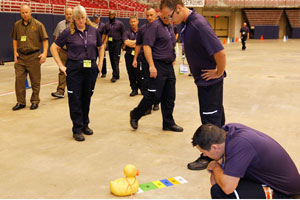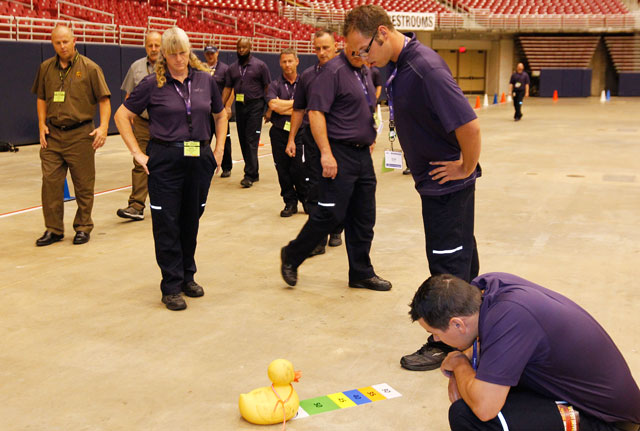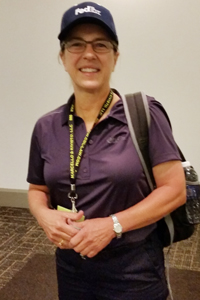Senior Reporter
Fewer Women Qualify for NTDC One Year After Record

 FedEx's Rebecca Nelson joins other drivers in the Aug. 12 walk-through. (John Sommers II for Transport Topics)
FedEx's Rebecca Nelson joins other drivers in the Aug. 12 walk-through. (John Sommers II for Transport Topics)ST. LOUIS — Please don’t try to tell Carmen Anderson that men are more competitive than women.
Not only has Anderson safely maneuvered a big rig down the interstates for years, as a mom she recently drove her son to become one of the top popcorn salesmen in his Boy Scout troop.
“I’m very competitive,” said Anderson, one of five female truck drivers among the 431 drivers who made it to the 2015 National Truck Driving Championships. “I got involved in the competition to test my skills.”
Anderson, South Dakota step van champ driving for TBI Inc., and her female counterparts mostly say they are generally respected by their male competitors. However, some acknowledge that gender barriers remain, but aren’t quite sure why women are not better represented in the contest that draws the best drivers in the nation.
LIVEONWEB: Women in Transportation (replay)
ONGOING COVERAGE: 2015 NTDC photos, video, stories and more
Eleven female drivers were in the competition last year — the most ever. But this year they lost ground.
“This is the lowest turnout I’ve seen for women since 2012,” said Boeing Co. driver Lisa Bry, Washington state straight truck champion. “I was kind of wondering why myself.”
Bry, who has made it to the nationals three of the past four years, said that preparing for the competition takes a lot of time away from family. “You have to practice to win, and you really have to be committed,” she said.
Bry said that her male counterparts treat her well but that some seemed “scared to say something. So I try to approach them because I’m a driver myself, and we all won in our states. We’re all good.”
"I guess I'm disappointed that the number actually dropped from last year. But I also think that you'll see the numbers increasing in coming years because more women are coming into the industry," said Ellen Voie, president of the Women in Trucking Association.
"Women don't know that they can do the job. They have no clue that they can become a professional truck driver," said Voie.
 Bain by Eric Miller/Transport Topics
Bain by Eric Miller/Transport TopicsThis year’s national competition was the first for Joyce Bain, a FedEx Ground driver who won the Maryland sleeper berth class.
Bain started driving in 1980 after taking a road test that convinced an employer to hire her.
“I was 21, and everywhere I went there was an audience because you did not see any women driving,” Bain said. “If there were, they were with a boyfriend or a husband.”
She didn’t see another woman driving alone until 14 years later, she said.
“My trainers said you have what it takes to be a driver,” Bain said. “The only problem you have is that you’re a female.”
According to Bain, it has not been uncommon for her to try to apply for a driving job, only to have the application thrown in the wastebasket.
“To be accepted, you have to be able to do the job, and maybe even a little bit better,” Bain said. “Then when you do it a little better, it intimidates the guys.”
While some of those old barriers remain, Bain said that these days, once other truck drivers know she can drive, she becomes a part of the family.
Some of the male competitors suggested that there just aren’t enough female drivers competing at the state level.
“Personally, I only know a couple of women truck drivers,” said Con-way Freight driver Sam Wilson, Nebraska twins champion. “But it’s cool that they’re here. It’s for anybody.”
“It’s not that we discriminate and don’t allow women to participate,” said Daniel Brandt, Wal-Mart Transportation driver and Wyoming flatbed champ. “There are just not a lot of ladies in the trucking industry. If they can do it, more power to them.”
Two other female drivers, FedEx Express Alaska step van champion Rebecca Nelson, and Fremont Beverage driver and Wyoming sleeper berth champ Angela Leary, said they could not explain the lower number of female competitors this year.
To be eligible for nationals, drivers need to not only be state champs in their class or overall grand champions, but accident-free for a year before the competition and have driven for their carriers for at least a year.


